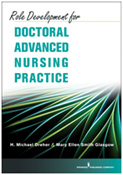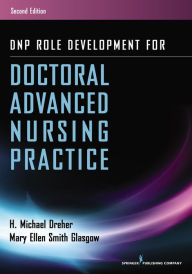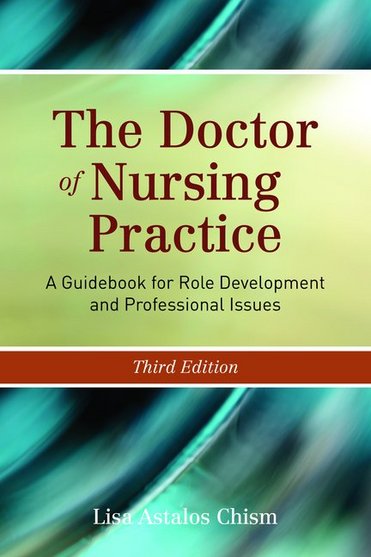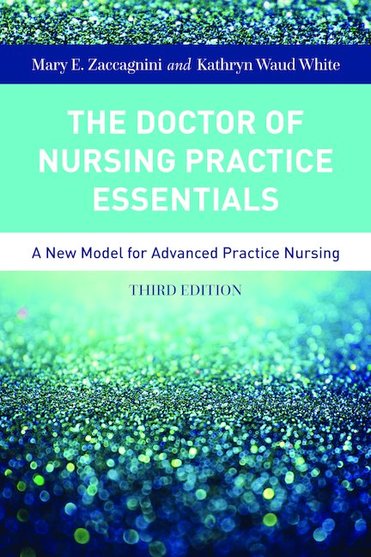| Course Number: | NR703 |
|---|---|
| Course Title: | Applied Organizational & Leadership Concepts |
| Course Credits: | 3 credits |
| Course Prerequisites: | NR 700, NR 701 |
Syllabus
Overview
Course Description
The focus of this course is on application of organizational and leadership concepts to foster and promote healthcare systems conducive to relationship-based care that improve care-focused outcomes.
Clinical Compliance Requirements
Chamberlain does not have specific practicum compliance requirements for DNP students. Meeting student compliance requirements will only be necessary when the student’s practicum facility requires it. Students who do not complete the facility-specific requirements prior to the start of the course will not be registered or will be withdrawn from the course. Students should direct any questions to DNPPracticum@chamberlain.edu.
Textbooks and Resources
Required Textbooks
The following books are required for this course:
Dreher, H. M., & Glasgow, M. E. S. (2011). Role development for doctoral advanced nursing practice. New York, NY: Springer Publishing Company.
Dreher, H. M., & Glasgow, M. E. S. (2016). Role development for doctoral advanced nursing practice (2nd ed.). New York, NY: Springer Publishing Company.
Marshall, E. S. (2011). Transformational leadership in nursing: From expert clinician to influential leader. New York, NY: Springer Publishing Company
Marshall, E. S. (2016). Transformational leadership in nursing: From expert clinician to influential leader (2nd ed.). New York, NY: Springer Publishing Company.

American Psychological Association. (2010). Publication manual of the American Psychological Association (6th ed.). Washington, DC: Author.
Chism, L. A. (2016). The Doctor of Nursing Practice: A guidebook for role development and professional issues (3rd ed.). Burlington, MA: Jones & Bartlett Publishers.
Nelson, E. C., Batalden, P. B., & Godfrey, M. M. (2007). Quality by design: A clinical microsystems approach. San Francisco: Jossey-Bass.
Zaccagnini, M. E. & White, K. W. (2017). The Doctor of Nursing Practice essentials: A new model for advanced practice (3rd ed.). Burlington, MA: Jones & Bartlett Publishers.
Physical Books and Supplies
To obtain all your books and supplies, visit the online Chamberlain bookstore at https://bookstore.chamberlain.edu/.
eBook Details
First Time Using VitalSource?
Step 1: View the VitalSource Video
Step 2: Register with VitalSource Bookshelf Online
- Click the cover or title of your eBook. A new window will open.
- Enter email address and password. Bookshelf Online will open.
Step 3: Access the Desktop and Mobile Versions
You must complete Step 2 prior to using the desktop or mobile versions.
Already Registered? 3 Ways to Access Your eBooks

Online
Access your eBook by clicking on the book cover or title in the syllabus page. Bookshelf Online will open.

Desktop
Download your eBooks and use them whether you're connected to the Internet or not.

Mobile
Download the app and get your eBooks on your iPhone, iPad, or Android device.
Program Outcomes
The outcomes for the Doctor of Nursing Practice (DNP) degree program are as follows:
1
Apply biophysical, psychosocial, sociopolitical and cultural principles to integrative healthcare economics, nursing science and ethics in evidence-based advanced nursing practice to improve the nation\'s health using cultural humility and population-focused healthcare that is holistic and person-centered.(DNP Essentials VII, VIII; DNP/C: I-IV).
2
Formulate a professional identity leadership role as an extraordinary DNP-prepared nurse in application, formation and reformation of health policy and advocacy in healthcare at micro, meso and macro levels (DNP Essentials V; DNP/C: III-IV).
3
Synthesize scientific methods and underpinnings to develop best practices with a spirit of inquiry to shape advanced nursing judgment and systems of care for person/family and populations to improve care focused outcomes (DNP Essentials I, III; DNP/C: III-IV).
4
Build advanced nursing practice on relationship-based care and care-focused delivery models that embrace political, ethical, professional, economic, socially just and culturally appropriate services across healthcare systems (DNP Essentials VIII; DNP/C: II-IV).
5
Integrate scientific-based theories and concepts that facilitate best practices with a spirit of inquiry for the nature and significance of health and healthcare delivery phenomena with strategies to improve healthcare delivery and outcomes, appreciating theory-based healthcare for evidence-based practice (DNP Essentials I, III; DNP/CC: II-IV).
6
Distinguish organizational and transformational leadership that fosters and promotes patient safety, human flourishing, integration of healthcare technology and informatics to improve patient safety and care-focused outcomes for quality improvement and systems thinking that improves and transforms healthcare (DNP Essentials II, IV; DNP/C: I-III).
7
Assimilate concepts of healthcare technology and informatics to make data-driven decisions that inform advanced nursing practice and person-centered care systems that are nurse-sensitive and person/family-and population focused (DNP Essentials IV; DNP/C: I-III).
8
Exercise intra- and inter-professional collaboration as an extraordinary DNP-prepared nursing role model for collegiality and professionalism across healthcare systems to facilitate optimal care and care-focused outcomes that improve person/family and population health or practice outcomes (DNP Essentials VI; DNP/C: I-III).
9
Synthesize conceptual and analytical skills in evaluating links among practice, organization, population, fiscal and policy issues as a basis for transformational change across healthcare systems (DNP Essentials V; DNP/C: III-IV).
Course Outcomes
Chamberlain College of Nursing courses are built to align course content with specific Course Outcomes (COs). The COs define the learning objectives that the student will be required to comprehend and demonstrate by course completion. The COs that will be covered in detail each week can be found in the Overview page in that particular week. Whenever possible, a reference will be made from a particular assignment or discussion back to the CO that it emphasizes.
Upon completion of this course, the student will be able to do the following.
1
Compare and contrast existing theories of organizational behavior and leadership theory with that of quantum leadership. (PO 6)
2
Distinguish the impact of complexity, chaos, change, and innovation theory on the future of advanced nursing practice. (PO 6)
3
Differentiate attributes of effective leaders and followers and related roles in positively influencing advanced nursing practice. (PO 6)
4
Assimilate relationship-based and patient-centered care attributes for intra-/inter-professional collaboration in advanced nursing practice. (PO 8)
5
Synthesize evidence of transformational leadership and emotional intelligence necessary for intra-/inter-professional collaboration in advanced nursing practice. (PO 8)
6
Formulate selected strategies for increasing intra-/inter-professional collaboration and influence across healthcare systems. (PO 8)
7
Explore ethical dilemma outcomes of organizational and leadership behavior such as mobbing and bullying that have an adverse impact on advanced nursing practice and intra-/inter-professional collaboration. (PO 8)
8
Analyze mandatory reporting threats to the future of healthcare and patient safety improvements. (PO 6)
9
Examine selected quality improvement and intra-/inter-professional practice models that serve to support patient safety and advanced nursing practice. (PO 6)
10
Ascertain readiness of one’s practice setting for potential advanced nursing practice benefits from the forces of magnetism. (PO 6)
Course Schedule
| Week, COs, and Topics | Readings | Assignments |
|---|---|---|
Week 1 Organizational Behavior, Leadership, and Role Theories | Chism, L. A. (2016). The Doctor of Nursing Practice: A guidebook for role development and professional issues (3rd ed.). Burlington, MA: Jones & Bartlett.
Dreher, H. M., & Glasgow, M. E. S. (2016). Role development for doctoral advanced nursing practice (2nd ed.). New York, NY: Springer Publishing Company.
Zaccagnini, M. E., & White, K. W. (2017). The Doctor of Nursing Practice essentials: A new model for advanced practice nursing (3rd ed.). Sudbury, MA: Jones & Bartlett.
| Graded Discussion Topics |
Week 2 Complexity, Chaos, Change, and Innovation: Theories for Designing Healthcare Delivery System Change | Marshall, E. S. (2016). Transformational leadership in nursing: From expert clinician to influential leader (2nd ed.). New York, NY: Springer Publishing Company.
Nelson, E. C., Batalden, P. B., & Godfrey, M. M. (2007). Quality by design: A clinical microsystems approach. San Francisco, CA: Jossey-Bass.
Sargeant, J. (2009). Theories to aid understanding and implementation of interprofessional education. Journal of Continuing Education in the Health Professions, 29(3), 178–84. http://search.ebscohost.com.proxy.chamberlain.edu:8080/login.aspx?direct=true&db=rzh&AN=105434609&site=ehost-live Wilson, M. (2009). Complexity theory. Whitireia Nursing Journal, 16, 18–24. http://proxy.chamberlain.edu:8080/login?url=http://search.ebscohost.com/login.aspx?direct=true&db=rzh&AN=105269061&site=eds-live | Graded Discussion Topics |
Week 3 Interprofessional Collaboration Issues and Relationship-Based and Patient-Centered Care Attributes in Advanced Nursing Practice | Chism, L. A. (2016). The Doctor of Nursing Practice: A guidebook for role development and professional issues (3rd ed.). Burlington, MA: Jones & Bartlett Publishers.
Dreher, H. M., & Glasgow, M. E. S. (2016). Role development for doctoral advanced nursing practice (2nd ed.). New York, NY: Springer Publishing Company.
Nelson, E. C., Batalden, P. B., & Godfrey, M. M. (2007). Quality by design: A clinical microsystems approach. San Francisco, CA: Jossey-Bass.
| Graded Discussion Topics |
Week 4 Transformational Leadership and Emotional Intelligence Attributes for Interprofessional Collaboration in Advanced Nursing Practice | Marshall, E. S. (2016). Transformational leadership in nursing: From expert clinician to influential leader (2nd ed.). New York, NY: Springer Publishing Company.
| Graded Discussion Topics |
Week 5 Ethical Considerations and Adverse Actions Impacting Patient Safety and Advanced Nursing Practice | Brinkman, A. (2010). Positive caring that works! Kai Tiaki Nursing New Zealand, 16(5), 28. Chism, L. A. (2016). The Doctor of Nursing Practice: A guidebook for role development and professional issues (3rd ed.). Sudbury, MA: Jones & Bartlett.
Dreher, H. M., & Glasgow, M. E. S. (2016). Role development for doctoral advanced nursing practice (2nd ed.). New York, NY: Springer Publishing Company.
Nelson, E. C., Batalden, P. B., & Godfrey, M. M. (2007). Quality by design: A clinical microsystems approach. San Francisco, CA: Jossey-Bass.
Zaccagnini, M. E., & White, K. W. (2017). The Doctor of Nursing Practice
| Systems Change Project Graded Discussion Topics |
Week 6 Conflict Management, Professional Practice, and Quality Improvement Strategies in Advanced Nursing Practice | Dreher, H. M., & Glasgow, M. E. S. (2016). Role development for doctoral advanced nursing practice (2nd ed.). New York, NY: Springer Publishing Company.
| Graded Discussion Topics |
Week 7 Formulating Advanced Nursing Practice Leadership Strategies From an Ethic of Care | Dreher, H. M., & Glasgow, M. E. S. (2016). Role development for doctoral advanced nursing practice (2nd ed.). New York, NY: Springer Publishing Company.
Ozturk, H., Sokmen, S., Yilmaz, F., & Cilingir, D. (2008). Measuring mobbing experiences of academic nurses: Development of a mobbing scale. Journal of the American Academy of Nurse Practitioners, 20(9), 435–442. http://search.ebscohost.com.proxy.chamberlain.edu:8080/login.aspx?direct=true&db=a2h&AN=34137494&site=ehost-live Sorbello, B. (2008). The nurse administrator as caring person: A synoptic analysis applying caring philosophy, Ray's ethical theory of existential authenticity, the ethic of justice, and the ethic of care. International Journal for Human Caring, 12(1), 44–49. http://search.ebscohost.com.proxy.chamberlain.edu:8080/login.aspx?direct=true&db=rzh&AN=105909168&site=ehost-live | Advanced Practice Leadership Paper Graded Discussion Topics |
Week 8 Visioning the Future and Forces of Magnetism | Chism, L. A. (2016). The Doctor of Nursing Practice: A guidebook for role development and professional issues (3rd ed.). Sudbury, MA: Jones & Bartlett.
Dreher, H. M., & Glasgow, M. E. S. (2016). Role development for doctoral advanced nursing practice (2nd ed.). New York, NY: Springer Publishing Company.
Kaplow, R., & Reed, K. D. (2008). The AACN synergy model for patient analysis care: A nursing model as a force of magnetism. Nursing Economic$, 26(1), 17–25. http://search.ebscohost.com.proxy.chamberlain.edu:8080/login.aspx?direct=true&db=rzh&AN=105869381&site=ehost-live Tomey, A. M. (2009). Nursing leadership and management effects work environments. Journal of Nursing Management, 17(1), 15–25. Zaccagnini, M. E., & White, K. W. (2017). The Doctor of Nursing Practice essentials: A new model for advanced practice nursing (3rd ed.). Sudbury, MA: Jones & Bartlett.
| You Decide Reflection Paper Graded Discussion Topics |
Turnitin
Students agree that, by taking this course, all work submitted for a grade is subject to submission for textual similarity review to Turnitin.com for the detection of plagiarism. All submitted papers will be included as source documents in the Turnitin.com reference database solely for the purpose of detecting plagiarism of such papers. Use of the Turnitin.com service is subject to the Terms and Conditions of Use posted on the Turnitin.com site.
Purpose:
The purpose of this Turnitin® policy is to facilitate the formative development of scholarly writing skills.
Overview:
Turnitin® is a web-based resource that Chamberlain College of Nursing makes available to students and faculty to comprehensively check written work to identify a similarity index for matching text with a database of existing written work, web pages, and electronic journals. Turnitin® assists students to identify potential plagiarism and supports the student toward academic integrity and originality in order to further develop their scholarly writing skills. Student assignments that are submitted to Turnitin® generate a Turnitin® Originality Report that students use to further edit their written work prior to submitting to faculty for feedback and evaluation.
Information about Turnitin® can be located in the Chamberlain School of Nursing Student Handbook. The link to Turnitin.com is placed in every online course under the “Course Home” tab, which is located at the bottom of the list.
Policy:
All faculty members teaching in the Doctor of Nursing Practice (DNP) program will use TurnItIn for each written assignment in all courses unless the syllabus states that a particular assignment is excluded. Additionally, all faculty will screen at least one complete discussion for plagiarism, using TurnItIn: This requirement must occur after the discussion has ended, but during the first four weeks of the course.
TurnItIn Excluded Assignments
The following assignments will be excluded from Turnitin for this course:
- You Decide Reflection (Week 8)
Late Assignment Policy
Students are expected to submit assignments by the time they are due. Assignments submitted after the due date and time will receive a deduction of 10% of the total points possible for that assignment for each day the assignment is late. Assignments will be accepted, with penalty as described, up to a maximum of three days late, after which point a zero will be recorded for the assignment.
In the event of an emergency that prevents timely submission of an assignment, students may petition their instructor for a waiver of the late submission grade reduction. The instructor will review the student’s rationale for the request and make a determination based on the merits of the student’s appeal. Consideration of the student’s total course performance to date will be a contributing factor in the determination. Students should continue to attend class, actively participate, and complete other assignments while the appeal is pending.
This Policy applies to assignments that contribute to the numerical calculation of the course letter grade.
Due Dates for Assignments and Exams
Unless otherwise specified, the following applies.
- Access to the course begins on Sunday at 12:01 a.m. (MT) during preview week.
- All assignments are to be submitted on or before Sunday at the end of the specified week that they are due by 11:59 p.m. (MT).
Note: In Week 8, the assignments would be due by Wednesday at 11:59 p.m. MT.
Evaluation Methods
| Letter Grade | Points | Percentage |
|---|---|---|
| A | 940–1,000 | 94% to 100% |
| A- | 920–939 | 92% to 93% |
| B+ | 890–919 | 89% to 91% |
| B | 860–889 | 86% to 88% |
| B- | 840–859 | 84% to 85% |
| C+ | 810–839 | 81% to 83% |
| C | 760–809 | 76% to 80% |
| F | 759 and below | 75% and below |
The maximum score in this class is 1,000 points. The categories, which contribute to your final grade, are weighted as follows.
| Assignment | Points | Weighting |
|---|---|---|
| Discussions(25 points per thread, Weeks 1–8) (see Course Schedule for COs) | 375 | 37.5% |
| Systems Change Project (Week 5) (COs 2, 8, and 9) | 250 | 25% |
| Advanced Practice Leadership Paper (Week 7) (COs 4, 6, and 7) | 275 | 27.5% |
| You Decide Reflection Paper(Week 8)(COs 1, 3, 5, and 10) | 100 | 10% |
| Total Points | 1,000 | 100% |
***The faculty of record is responsible for all evaluation of student performance and makes the final determination of grades regarding student evaluation. | ||
Participation for DNP
Threaded Discussion Guiding Principles
The ideas and beliefs underpinning the threaded discussions (TDs) guide students through engaging dialogues as they achieve the desired learning outcomes/competencies associated with their course in a manner that empowers them to organize, integrate, apply and critically appraise their knowledge to their selected field of practice. The use of TDs provides students with opportunities to contribute level-appropriate knowledge and experience to the topic in a safe, caring, and fluid environment that models professional and social interaction. The TD’s ebb and flow is based upon the composition of student and faculty interaction in the quest for relevant scholarship. Participation in the TDs generates opportunities for students to actively engage in the written ideas of others by carefully reading, researching, reflecting, and responding to the contributions of their peers and course faculty. TDs foster the development of members into a community of learners as they share ideas and inquiries, consider perspectives that may be different from their own, and integrate knowledge from other disciplines.
Participation Guidelines
Each weekly threaded discussion is worth up to 25 points. Students must post a minimum of two times in each graded thread. The two posts in each individual thread must be on separate days. The student must provide an answer to each graded thread topic posted by the course instructor, by Wednesday, 11:59 p.m. MT, of each week. If the student does not provide an answer to each graded thread topic (not a response to a student peer) before the Wednesday deadline, 5 points are deducted for each discussion thread in which late entry occurs (up to a 10 point deduction for that week). Subsequent posts, including essential responses to peers, must occur by the Sunday deadline, 11:59 p.m. MT of each week.
Grading Rubric
| Discussion Criteria | 4-5 Points | 2-3 Points | 0-1 Points |
|---|---|---|---|
| NOTE: There is only one discussion thread in Week 8. | |||
| Support from Literature (5 points possible per graded thread) | Support from the literature is present and includes a minimum of one scholarly in-text citation and matching reference, per each thread topic per week. | Support from literature is present (in-text citation and reference) but is not scholarly. | No support from the literature. |
| Application of Course Knowledge (5 points possible per graded thread) | Post contributes unique perspectives or insights gleaned from personal experience or examples from the healthcare field. | Post has limited application of course knowledge and demonstration of perspectives. | Post does not reflect application of course knowledge and personal insights or examples from healthcare. |
| Organization (5 points possible per graded thread) | Post presents information in logical, meaningful, and understandable sequence, clearly relevant to the discussion topic. | Information is sometimes unclear and difficult to follow. | Post is not relevant to discussion questions. |
| Interactive Dialogue (5 points possible per graded thread) | Responds substantively to at least one topic-related post of a student peer. A substantive post adds content or insights or asks a question that will add to the learning experience and/or generate discussion. | Responds to student peers, but the nature of the response to topic-related posts is not substantive. | Does not respond to any topic-related posts of student peers. |
| Grammar, Syntax, APA Format (5 points possible per graded thread) | APA format, grammar, spelling, and/or punctuation are accurate, or with zero to three errors. | Four to six errors in APA format, grammar, spelling, and syntax noted. | Post contains greater than six errors in APA format, grammar, spelling, and/or punctuation or repeatedly makes the same errors after faculty feedback. |
| Total Participation Requirements per discussion thread | 0 points lost Student answers the threaded discussion question or topic on one day and posts a second response on another day. | -5 points Student did not meet this requirement. | |
| Early Participation Requirement per discussion thread | 0 points lost The student must provide a substantive answer to the graded discussion question(s)/topic(s), posted by the course instructor (not a response to a peer), by Wednesday, 11:59 p.m. MT of each week. | -5 points The student did not provide an answer to the graded discussion question(s)/topic(s), posted by the course instructor (not a response to a peer), by Wednesday, 11:59 p.m. MT of each week. | |
NOTE:To receive credit for a week's discussion, students may begin posting no earlier than the Sunday immediately before each week opens. Unless otherwise specified, access to most weeks begins on Sunday at 12:01 a.m. MT, and that week's assignments are due by the next Sunday by 11:59 p.m. MT. Week 8 opens at 12:01 a.m. MT Sunday and closes at 11:59 p.m. MT Wednesday. Any assignments and all discussion requirements must be completed by 11:59 p.m. MT Wednesday of the eighth week.
Professional Portfolio
Across the DNP program, you will collect assignments and compile them as artifacts within a Professional e-Portfolio to demonstrate your professional growth and expertise. Your final e-Portfolio, which will be submitted at the end of the degree program, will be assessed against the learning outcomes of the program. Chamberlain College of Nursing will provide detailed information regarding how and when to submit your Professional e-Portfolio in your final courses of the program. It is each student's responsibility to save and maintain all artifacts required in the e-Portfolio.
Be sure to save the following from this course:
- W8 You Decide Reflection






